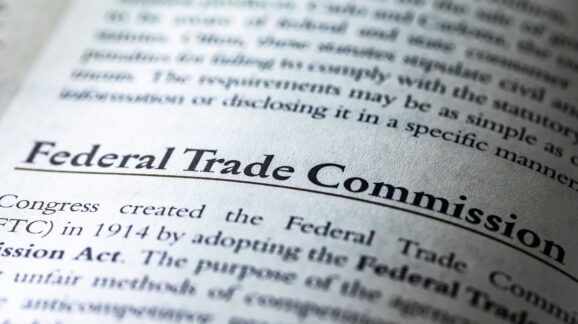FTC, or ‘Fundraising Trade Commission,’ tries to shrug off a Supreme Court judgment

Photo Credit: Getty
If you thought the Federal Trade Commission (FTC) was only coming after “big” business, think again. The FTC is targeting small and family businesses too.
In the last two weeks, the FTC settled with two “big tech” companies on charges that they improperly retained user data. On Monday, June 5, Microsoft agreed to pay the FTC $20 million to settle claims that the company violated the Children’s Online Privacy Protection Act (COPPA) by improperly storing kids’ data from Xbox accounts. And last week, on May 31, Amazon agreed to pay $30.8 million to settle claims that it improperly handled Alexa voice recordings and Ring video recordings. Amazon denied violating the law, and it’s unclear that either of the charges led to actual damages.
For Amazon and Microsoft, the settlements are relatively modest. Even if the claims are baseless, settlement is easier than combatting an unpredictable pervasive regulator like the FTC. If challenging, the FTC is daunting for some of the largest tech companies. One can only imagine how difficult it is for small and family businesses.
For several decades, the FTC used Section 13(b) of the FTC Act to obtain large settlement awards from small businesses without having to first prove its claims at trial or in adjudication. Section 13(b) allows the FTC to seek an injunction against a company in federal court when it “is violating, or is about to violate, any provision of law enforced by the Federal Trade Commission.”
Attorneys for the Pacific Legal Foundation, a public interest law firm, explain what happened here: “If congressional authorization was an inch, however, the FTC took a mile.”
The FTC used Section 13(b) to do more than just stop purported illegal behavior. It used its injunction power as legal cover to extract settlements for restitution and disgorgement awards.
Restitution awards are meant to compensate injured consumers. Disgorgement awards are more punitive in nature and include excess money earned by the alleged illegal activity.
Fortunately, the Supreme Court put an end to one of the FTC’s favorite fundraising tools in April 2021. In AMG Capital Management, LLC v. Federal Trade Commission, the Court held that “Section 13(b) does not authorize the Commission to seek, or a court to award, equitable monetary relief such as restitution or disgorgement.”
For FTC Chair Lina Khan, the AMG Capital decision is an obstacle but not necessarily a road block. The FTC is now attempting to use Section 19 of the FTC Act to obtain the same monetary awards that were ruled unlawful in AMG Capital. Chair Khan expressed her dissatisfaction with the decision at the FTC’s open commission meeting in April 2022, saying
Although the AMG ruling was a big loss, I’m incredibly proud of our Agency’s response. In the wake of the ruling, our staff have worked tremendously hard to use our other legal tools and authorities for obtaining monetary relief, including through using Section 19…
In the aftermath of the AMG Capital case, she seems eager to ignore what the law is. Rather, she wants to enforce the law as she thinks it ought to be. This is administrative activism. The FTC is supposed to be a bipartisan independent agency, but is currently operating with only Democratic commissioners, which should raise extra concerns for members of Congress considering oversight.
For companies that fell victim to unlawful settlements before AMG Capital, the fight continues. The Pacific Legal Foundation (PLF) is currently engaged in three cases in which the FTC is attempting to maintain unlawful settlement awards against companies that never had their day in court. PLF attorney Caleb Kruckenberg discusses one of the cases, FTC v. Elite IT Partners, in a recent op-ed for Bloomberg Law.
My clients first learned about the lawsuit when a court-appointed receiver arrived with a court order to take possession of the business. The FTC’s case was a shocking mismatch with such overwhelming tactics. . . . With punishing fines on the table and threat of essentially unlimited fines, the stakes became truly dire. Without any other reasonable choice, my clients entered into a settlement agreement with the FTC where neither admitted any wrongdoing. But that came with a hefty disgorgement award of more than $13 million, which shuttered the business permanently.
When the FTC freezes a business’s assets, it can be awfully difficult for that business to afford representation to fight back. After liquidating both business and personal assets, Elite IT Partners managed to muster $1.2 million to pay to the FTC. But they remain subject to the terms of the $13 million illegal settlement.
Of that $1.2 million, the FTC paid just under a total of $300,000 to 31,075 former customers of Elite IT Partners. Each customer received a check for $9.43 as restitution. The remainder of award was deposited directly to the U.S. Treasury, not restored to allegedly harmed consumers.
Prior to the AMG Capital decision, the FTC secured billions of dollars in disgorgement awards, with $723.2 million in 2019 alone. Khan seems intent on continuing to extract massive settlement awards against both big and small business without ever having to provide due process. Considering her disregard for the limits placed upon the FTC by Congress and the Supreme Court in obtaining monetary settlements, one should wonder if the Federal Trade Commission should change its name to the “Fundraising Trade Commission.”